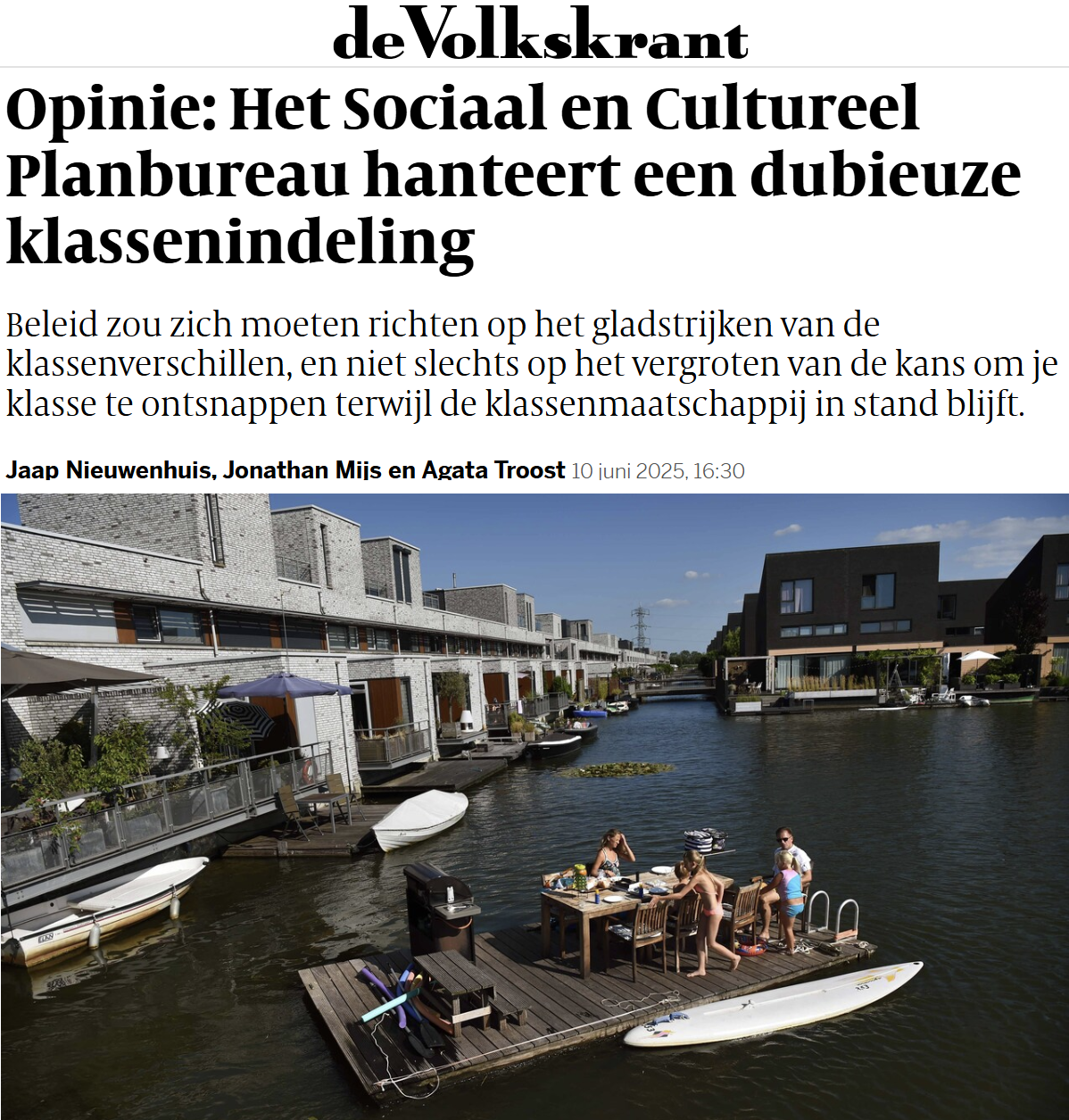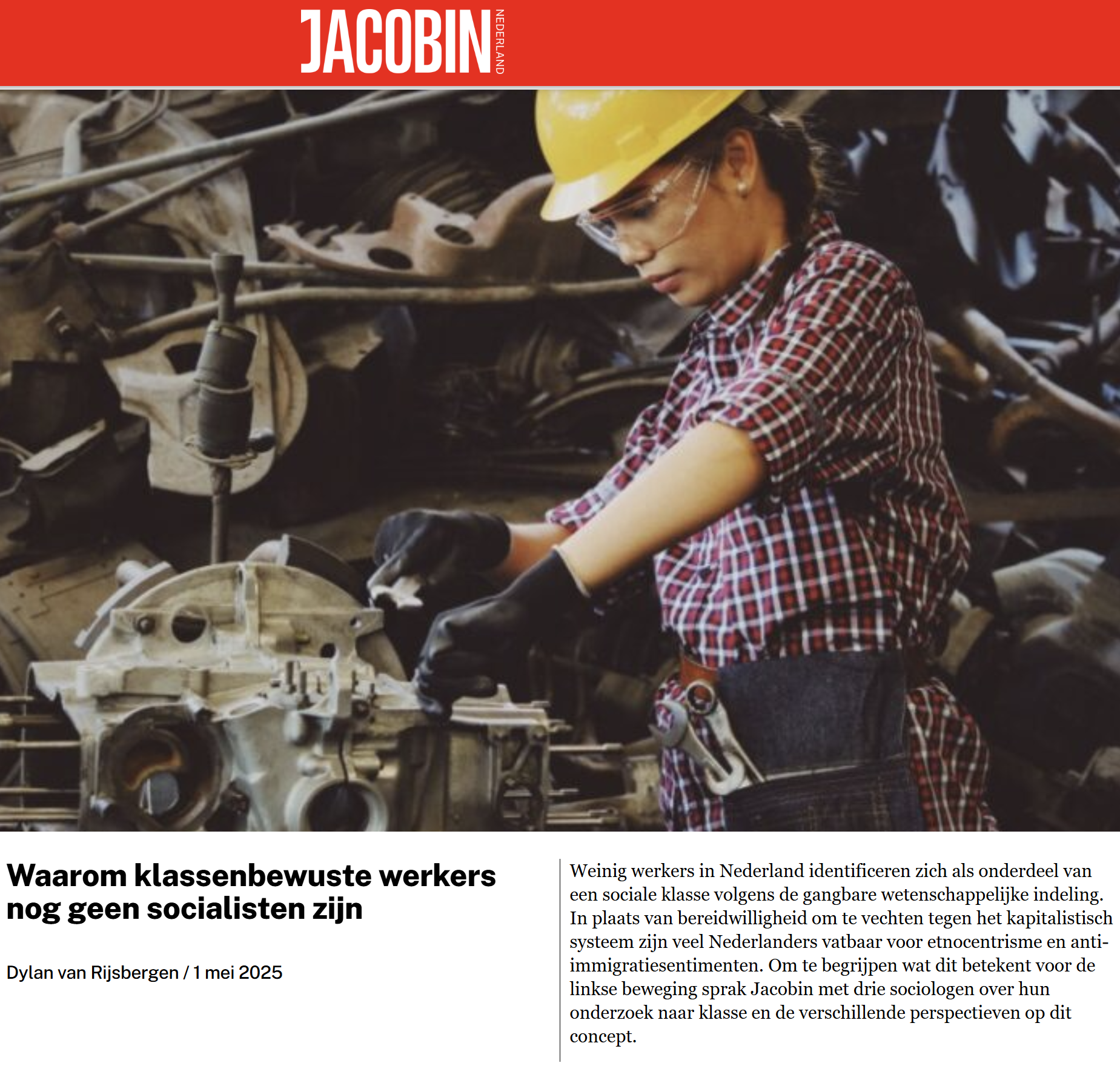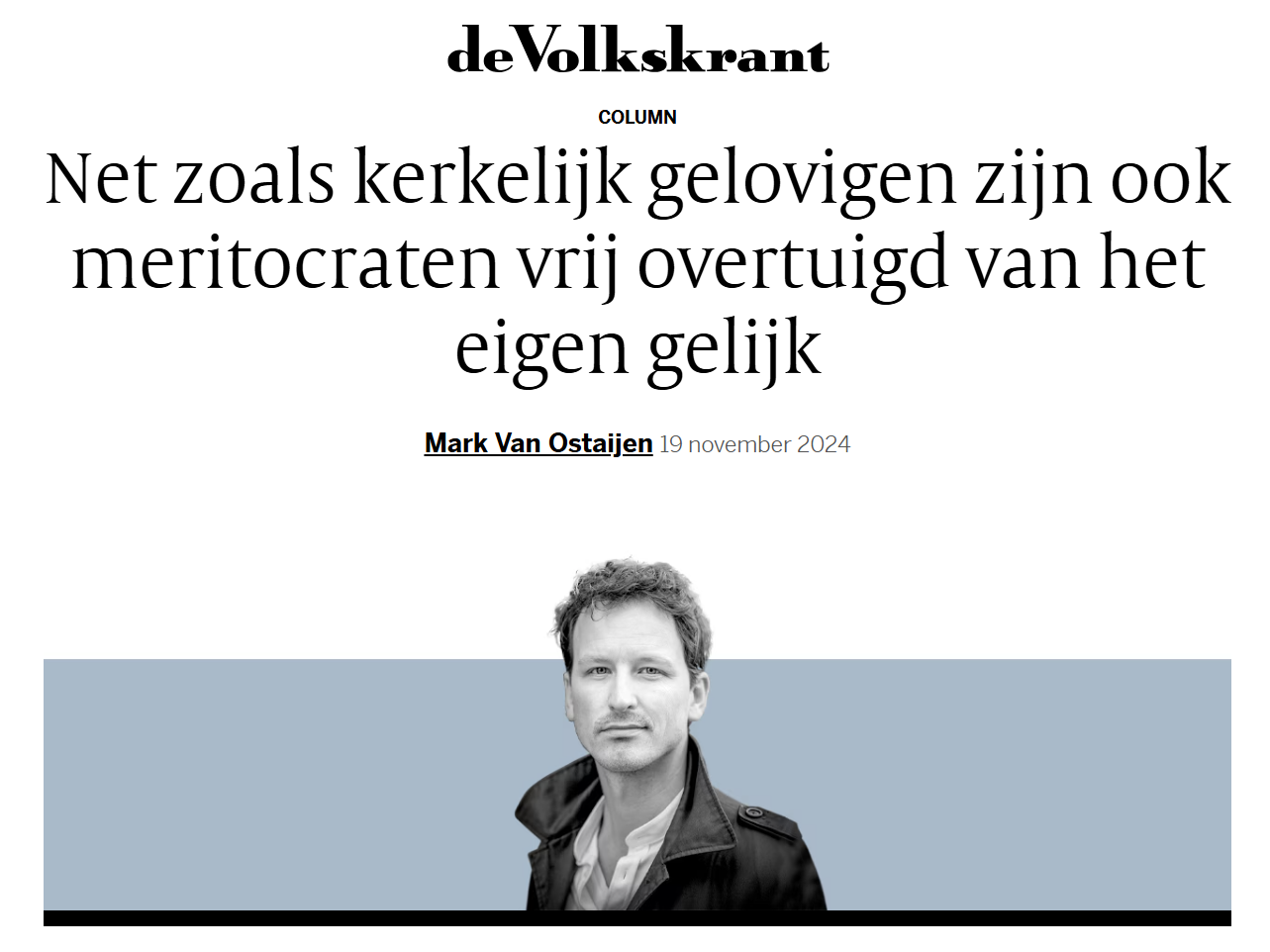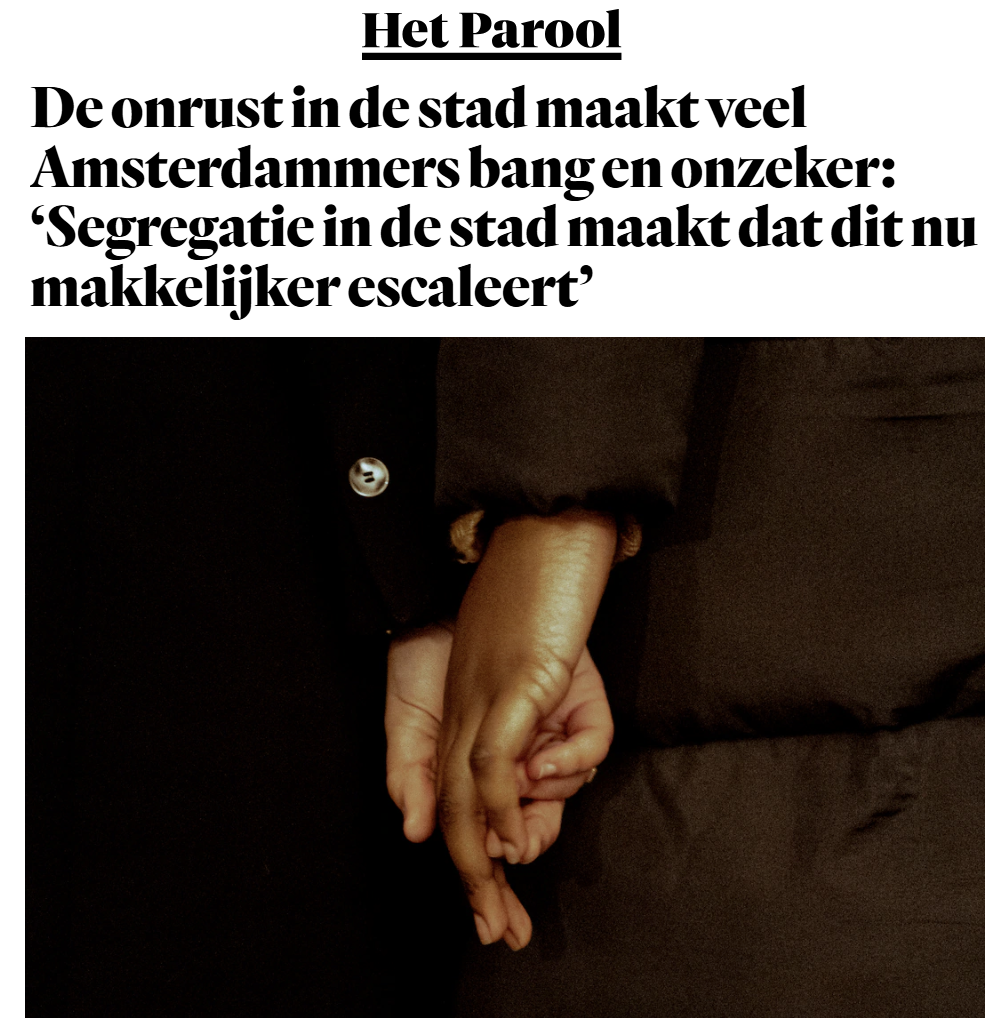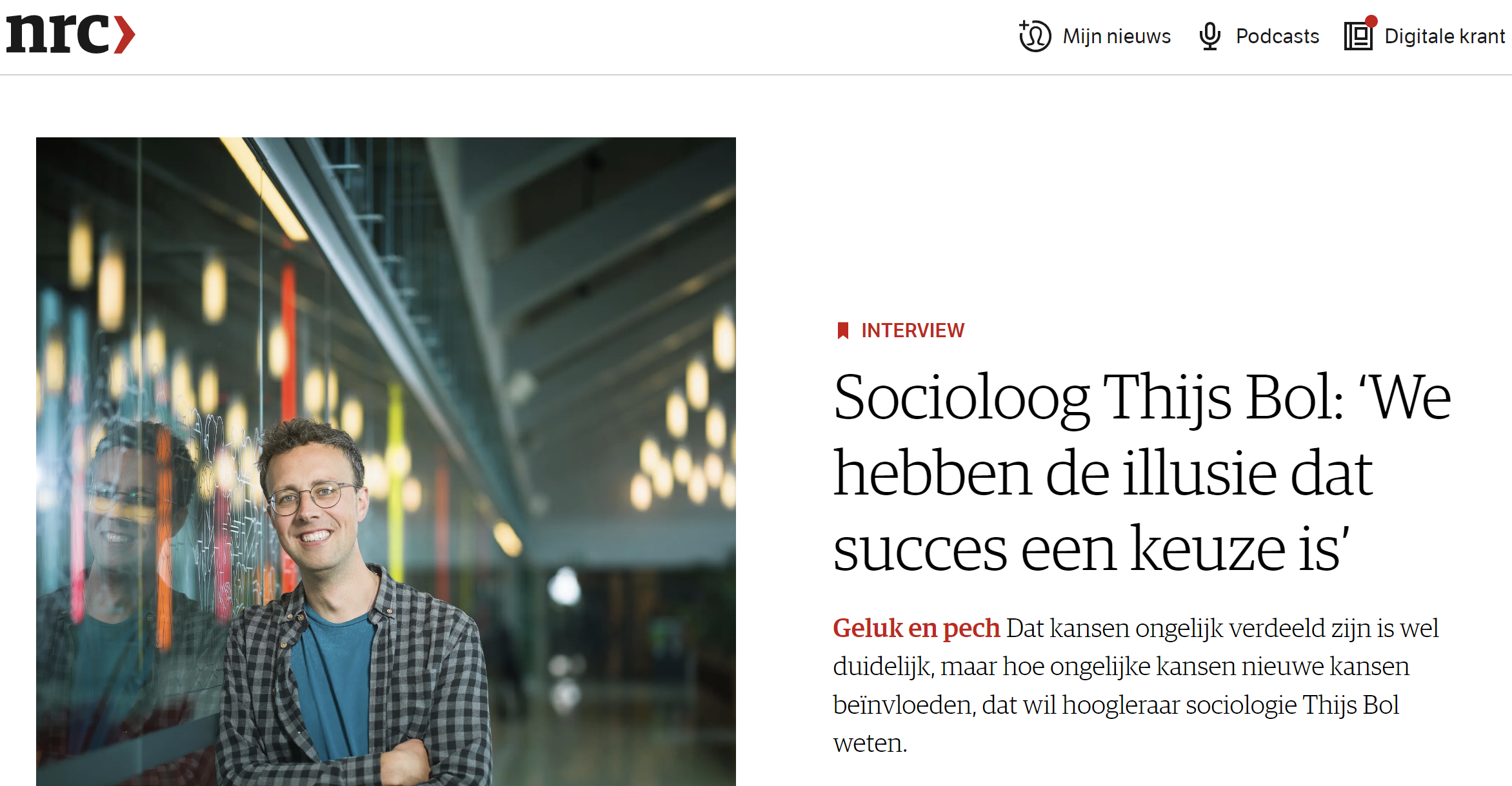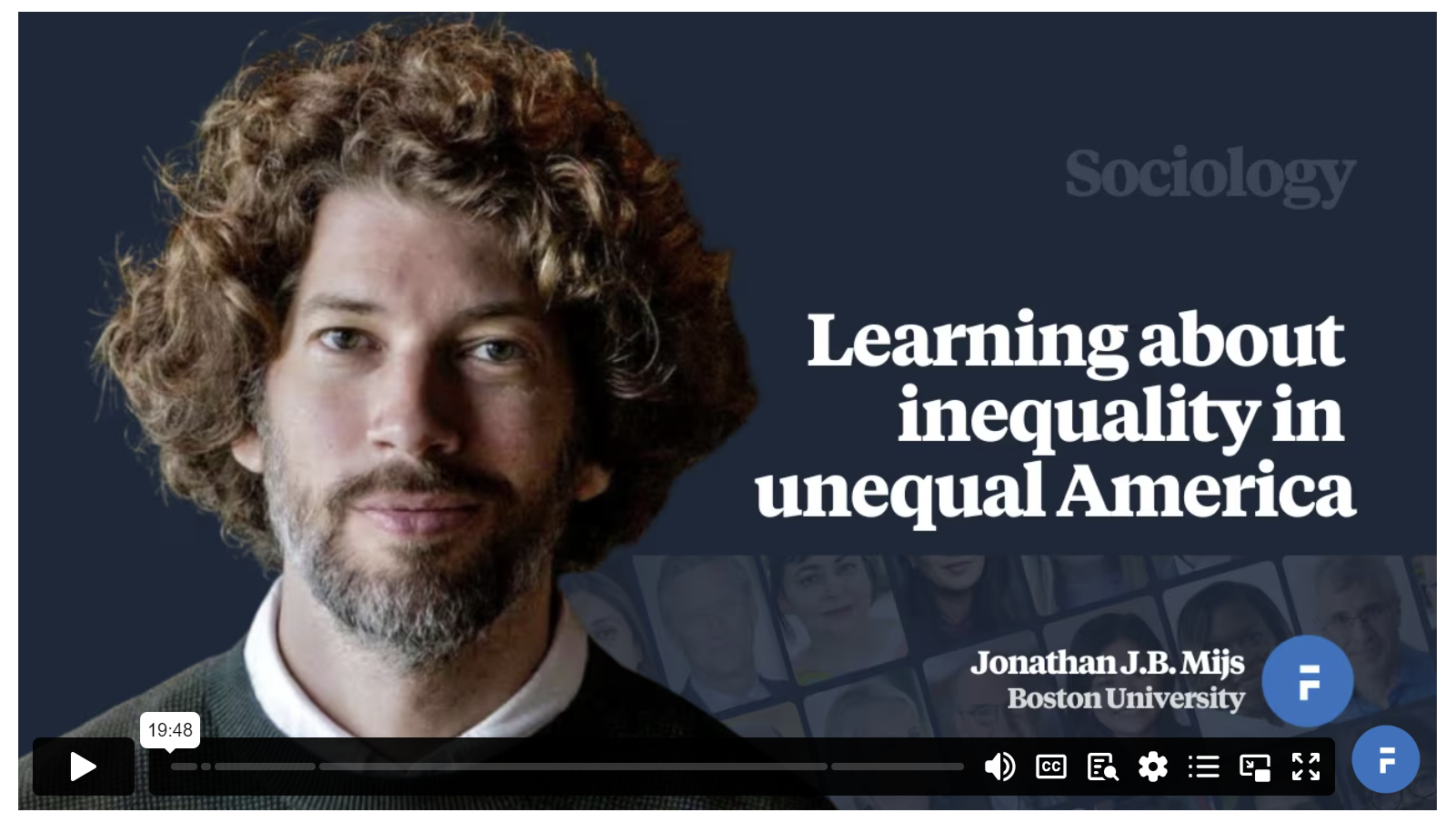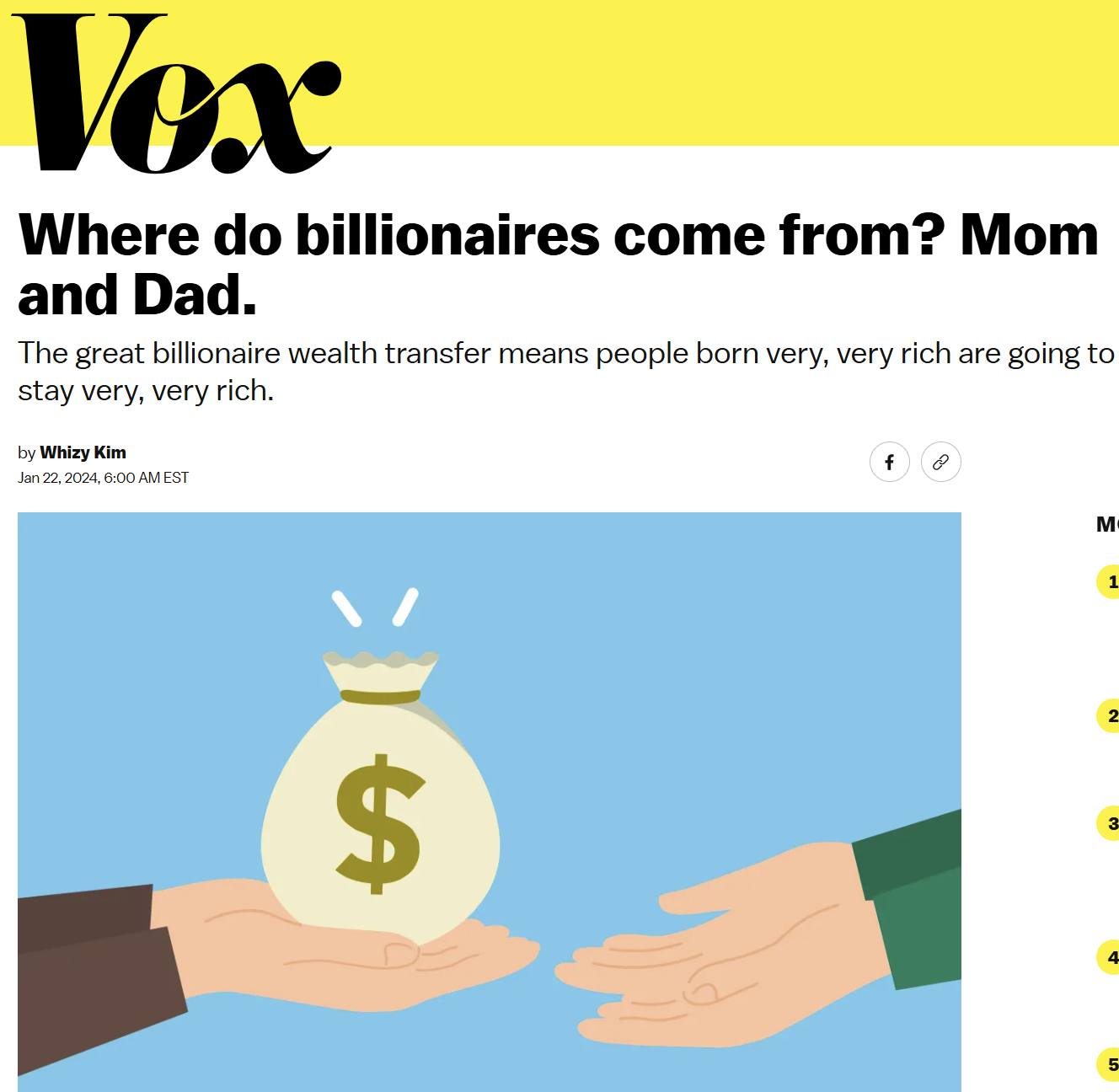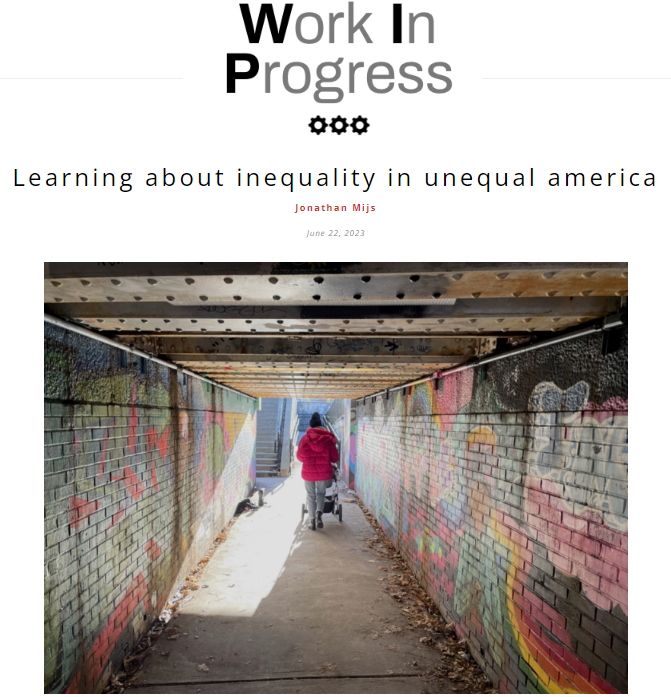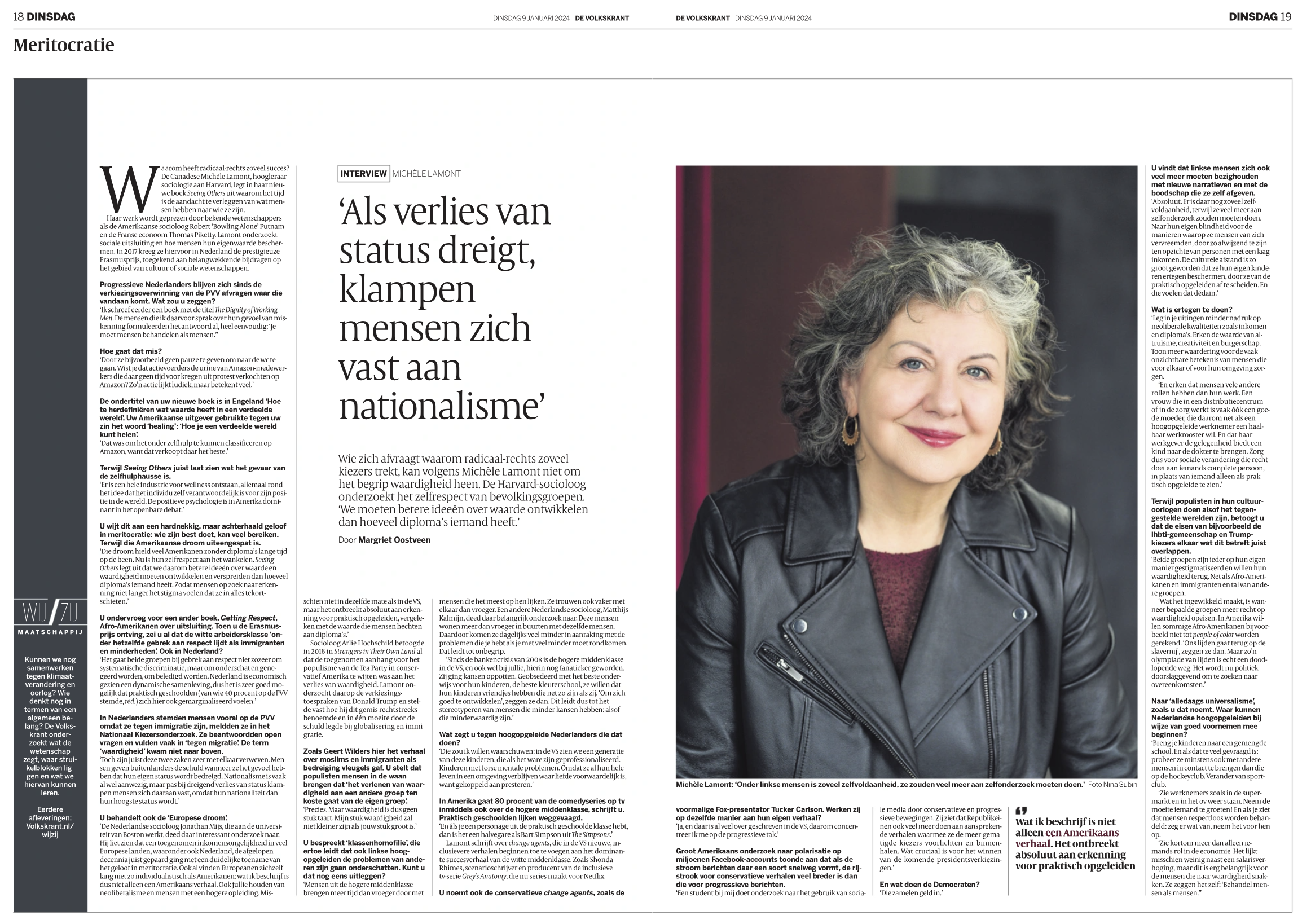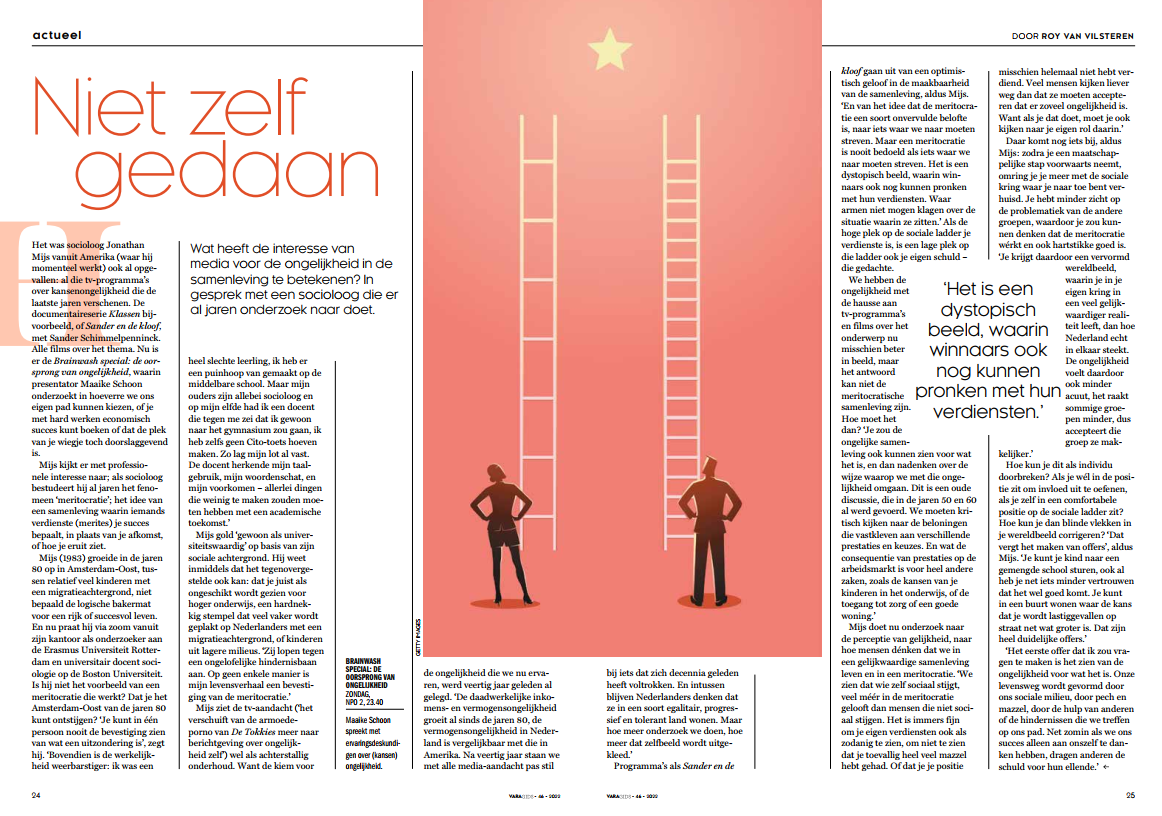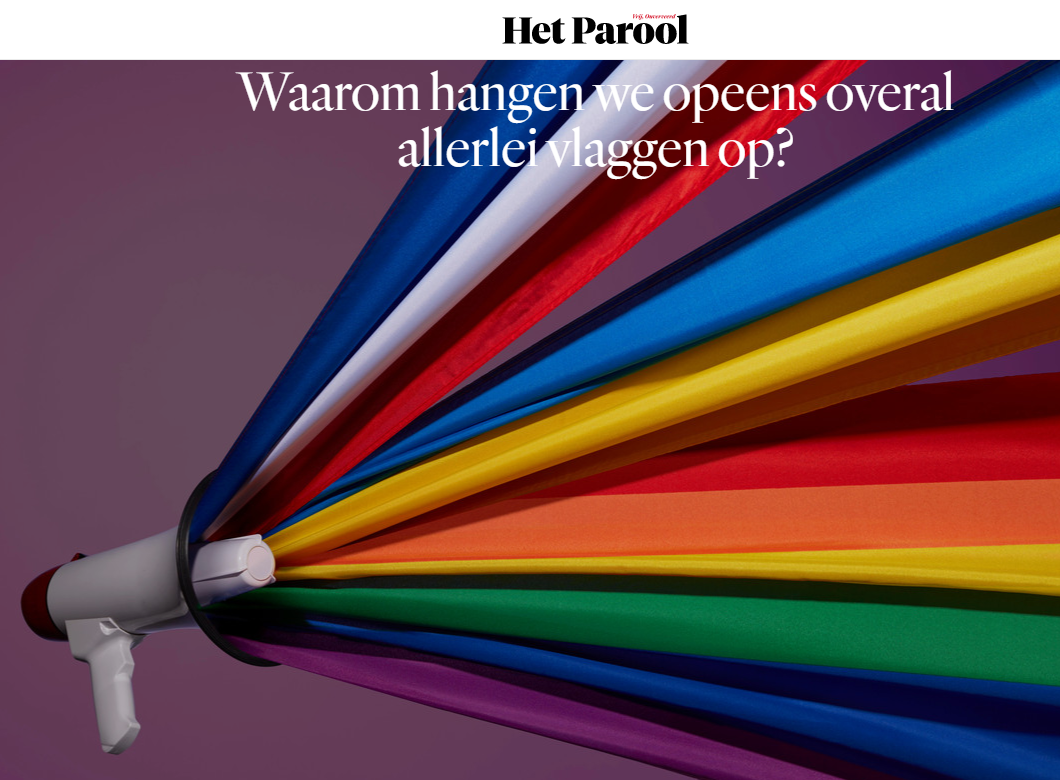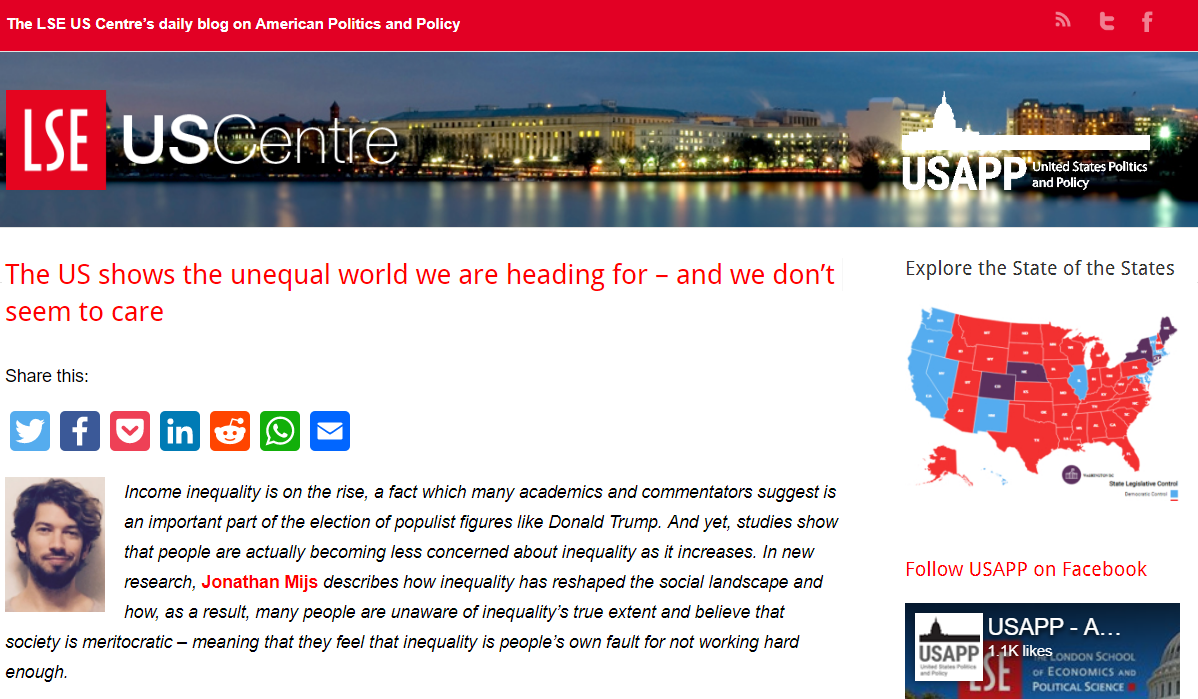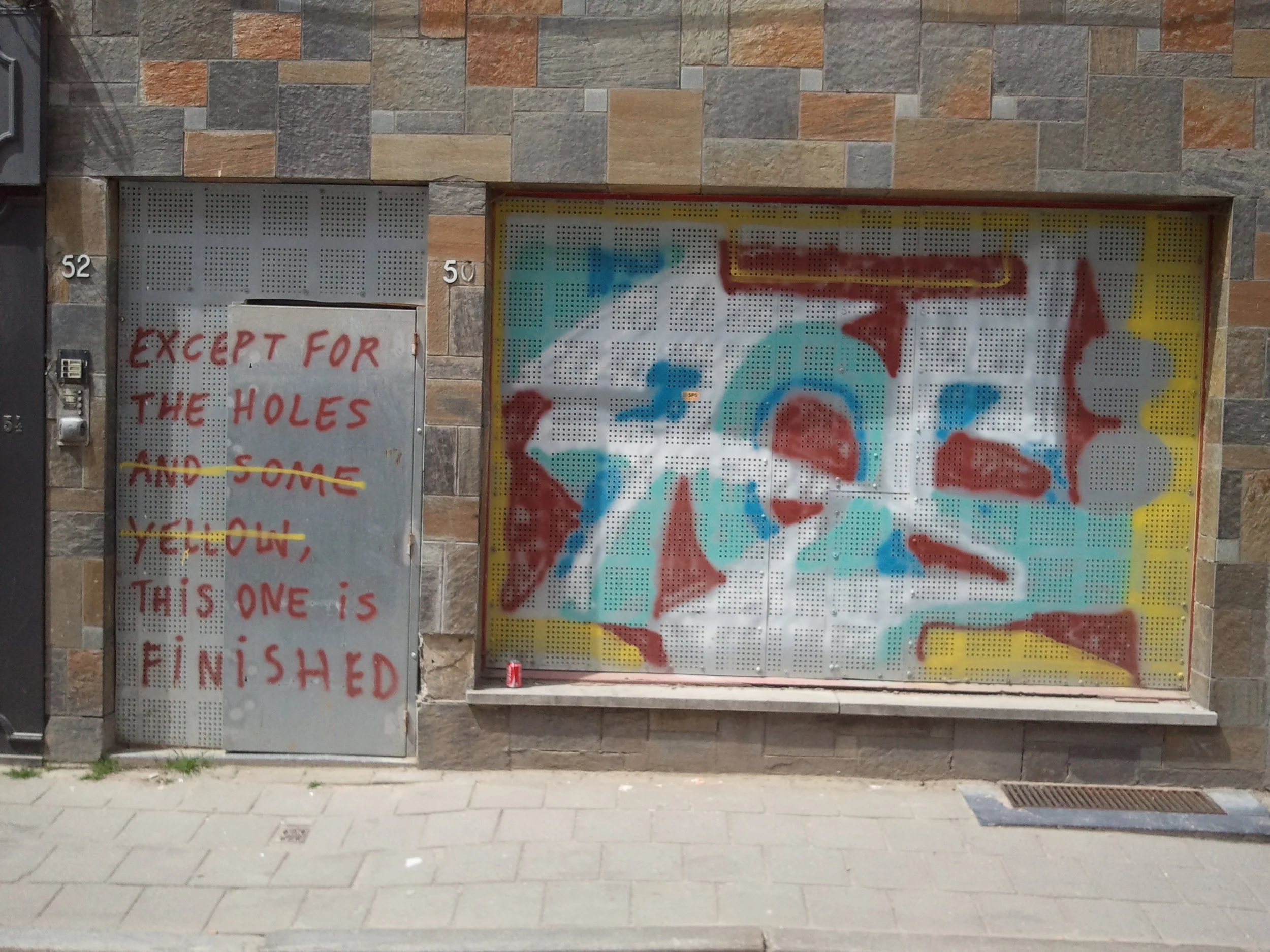De kansenongelijkheid in Nederland begint al tijdens de zwangerschap (Dutch)
Het Financieele Dagblad, September 18, 2025
Socioloog Jonathan Mijs, verbonden aan de universiteit van Boston, doet al jaren onderzoek naar ongelijkheid. Volgens hem hebben de meeste mensen daar een verkeerd beeld van. ‘Ze zien een gelijkere verdeling dan daadwerkelijk het geval is. Ze onderschatten de rijkdom van de bestbetaalde mensen, vooral door dingen die je minder snel ziet, zoals de opbrengsten van vermogen. Tegelijkertijd overschatten ze wat mensen aan de onderkant van de arbeidsmarkt verdienen. Daar zitten veel mensen op het randje, met tijdelijke contracten en zonder pensioenregeling.’ Onderwijs speelt een sleutelrol. Kinderen met een migratie-achtergrond krijgen volgens Mijs vaak te weinig aandacht op school. ‘Door hun kleinere woordenschat uiten ze zich op een zodanige manier dat leraren sneller denken dat ze dom zijn of dat ze het niet aankunnen. Dus de verwachtingen liggen ook minder hoog. Zo wordt het een selffulfilling prophecy. Het is een subtiele vorm van discriminatie.’ Read more or click for PDF.
What and how does the public think about wealth and wealth inequality, and what kinds of narratives make them more or less supportive of change?
Antisocial Economics Podcast, September 5, 2025
“If we want action on extreme wealth, how we frame it as a problem in the media and in campaigning activity matters. Specific ways of talking about it make the public more or less likely to support re- or pre-distributive measures. In this final, bumper episode we ask, what does the public think about wealth, the wealthy and wealth inequality, and can certain 'frames' increase public support for higher taxes on the rich? (Spoiler alert: Yes they can!). In part 1, Jonathan Mijs reflects on over a decade of work on understanding how the public perceives inequality, and the effect of system-justifying beliefs like meritocracy on support for redistribution. He introduces early findings from a recent collaborative project called Wealth Talks (www.wealthtalks.org), which examines how ordinary citizens in the global south and north discuss wealth and inequality in everyday conversations.” Listen to podcast on Spotify or Apple podcasts.
Wealthy households are driving Boston's rising income segregation. Here's how
The Boston Globe, August 20, 2025
"Jonathan Mijs, associate professor of sociology at Boston University, said income segregation also dictates how resources or spaces are allocated to neighborhoods. “The story of the United States in the last 50 years or so is a story of affluent people, kind of self sorting and self segregating from poorer people into particular neighborhoods, but also in particular schools, in particular workplaces,” Mijs said. One result of the class segregation, Mijs said, is that people will be less likely to acknowledge or understand the privileges they may have. “It’s not just that there is inequality, it’s also that some people are really set up in a way for success that other people aren’t,“ Mijs said. ”But not seeing that makes you believe in that idea that we are all here by virtue of our own hard work and our skills and talents.” Read more or click for PDF.
Hoe de Amsterdamse elite zich steeds verder afzondert: ‘Dit is de volgende stap op de segregatieladder’ (Dutch)
Het Parool, August 2, 2025
“Al dat geld wordt ook gespendeerd en dat zie je uiteraard terug in het straatbeeld, al is de manier waarop aan verandering onderhevig – een paar jaar geleden stonden immers VanMoofs en Tesla’s nog voor de nieuwe elite in de stad. Mensen met geld gaan naar dezelfde dure koffietentjes, kopen elektrische bakfietsen met de aanschafprijs van een prima tweedehands auto en doen hun boodschappen in de biologische winkel. Die scheiding van consumptiepatronen is al langer duidelijk, zegt socioloog Jonathan Mijs (40), die aan de Amerikaanse Boston University onderzoek doet naar ongelijkheid. Maar nu, zegt Mijs, lijkt Amsterdam de eerste tekenen te laten zien van wat hij sociale insluiting noemt. Een deel van de rijken trekt zich terug uit de openbare ruimte en zoekt geïsoleerde plekken om ‘onder ons’ te zijn.” Read more.
Beleid moet klassenverschillen gladstrijken in plaats van alleen de kans vergroten om aan je klasse te ontsnappen (Dutch)
De Volkskrant, June 10, 2025
"De Randstad kampt met een krimpende woningmarkt, terwijl de huizenprijzen in Drenthe dalen, de werkloosheid stijgt, en de bevolking vergrijst. Maar voeden de geografische tegenstellingen in Nederland ook de klassenverschillen en sociale ongelijkheid in het land? In zijn nieuwe rapport Verdeeld over het land stelt het Sociaal en Cultureel Planbureau (SCP) deze belangrijke vraag en geeft direct een antwoord: nee, niet echt. Dat is ook weinig verrassend, want in de uitwerking van het onderzoek wordt geografie grof gemeten en sociale klasse dermate verdund dat de verschillen verdampen." Read more or click for PDF.
Waarom klassenbewuste werkers nog geen socialisten zijn (Dutch)
Jacobin, May 1, 2025
"Als je Nederlanders vraagt tot welke klasse ze behoren, dan geven ze de meest uiteenlopende antwoorden, die zelden iets met sociale klasse te maken hebben. Dat is wat een drietal academici ontdekte in een kwantitatief onderzoek naar klasse in Nederland. Ze zagen ook dat mensen die zich wel in enige mate bewust waren van hun positie als werker in het kapitalistisch systeem, niet per definitie actiebereid waren. Vaak voelden zij zich juist machteloos en neigden ze daarnaast naar anti-immigratiesentimenten. Alleen de groep die echt actiebereid was, had minder etnocentristische ideeën, zo concluderen sociologen Jaap Nieuwenhuis, Agata Troost, en Jonathan Mijs in hun onderzoek hiernaar." Read more.
La izquierda se rebela contra el discurso de la “meritocracia” del PP (Spanish)
El País, April 6, 2025
"En el plano académico, el ideal “meritocrático” ha sido rebatido. Y con datos. En España, las circunstancias ajenas al esfuerzo explican hasta el 70% de las desigualdades, destacando como causas las herencias y la educación de los padres, según un trabajo del economista Pedro Salas-Rojo, investigador en el Instituto Internacional de Desigualdad de la London School of Economics. ... Todo ello no resta tirón político al discurso de la “meritocracia”, que según la evidencia disponible tiene mayor arraigo en sociedades con elevada desigualdad y entre aquellos que más sufren sus consecuencias. Así lo ha acreditado el sociólogo neerlandés Jonathan Mijs en estudios publicados en Socio-Economic Review, de Oxford, y en The Political Quarterly." Read more.
How Hulu's 'Paradise' explores the idea of a perfect society
ABC, March 3, 2025
“Meet Jonathan Mijs, an assistant professor of Sociology at Boston University who served as a technical consultant on Hulu's newest show, "Paradise." Starring Sterling K. Brown as Secret Service Agent Xavier Collins and James Marsden as US President Cal Bradford, "Paradise" follows Collins as he attempts to solve Bradford's sudden murder that has rattled his seemingly perfect and peaceful community. "What's really powerful about the show is how it visualizes a lot of these themes that social scientists have been thinking and writing about, and makes it so visceral," Mijs said about "Paradise." Read more.
Paradise
Hulu, Premiered on January 28, 2025
Technical consultant: Jonathan J.B. Mijs
De havermelkelite vindt verbinding in de kerk van het individualisme (Dutch)
Trouw, January 15, 2025
"Zijn stuk zette me aan het denken. Hoe die hogeropgeleiden zuil eruitziet, is makkelijk te duiden: mensen met meerdere diploma’s, progressieve ideeën, minimaal een middeninkomen en een partner die aan diezelfde criteria voldoet. De Jongs collega-socioloog Jonathan Mijs detecteerde het vorig jaar al in Het Parool: de maatschappij is tegenwoordig nou eenmaal op te delen in groepen mensen met een vergelijkbaar opleidingsniveau, inkomen en vermogen. Maar hoe komt dat, dat onze waarden en voorkeuren tegenwoordig meer beïnvloed worden door ons economische en academische profiel, dan door een gedeeld geloof of een gedeelde ideologie?" Read more or click for PDF
Ungleichheit in Deutschland: Wachsende Akzeptanz trotz steigender Armut (German)
Frankfurter Umschau, November 25, 2024
“Armut und Ungleichheit haben in Deutschland seit 2010 deutlich zugenommen. Laut dem gewerkschaftsnahen Wirtschafts- und Sozialwissenschaftlichen Institut (WSI) in Düsseldorf „strahlen die Sorgen um Lebensstandard bis in die Mittelschicht aus“. Mit wachsender Ungleichheit, so wird häufig vermutet, geht auch eine wachsende Unzufriedenheit der Bevölkerung einher. Gleichzeitig aber lässt sich diese Vermutung empirisch kaum belegen – offenbar empfinden die Menschen die Ungleichheit nicht als Ungerechtigkeit. „Die Zustimmung der Bürger zur Ungleichheit ist auf ihre wachsende Überzeugung zurückzuführen, dass gesellschaftlicher Erfolg das Ergebnis eines leistungsorientierten Prozesses ist“, so Jonathan J. B. Mijs von der London School of Economics." Read more.
Net zoals kerkelijk gelovigen zijn ook meritocraten vrij overtuigd van het eigen gelijk (Dutch)
De Volkskrant, November 19, 2024
"Zo toont onderzoek van de in Boston werkzame Nederlandse socioloog Jonathan Mijs aan dat Nederland wordt gekenmerkt door een sterk meritocratisch geloof. Een ‘heilig’ geloof in talent, inspanning en verdiensten, een geloof dat succes individueel maakbaar is. Zo geloven aanhangers van het meritocratisme ‘dat inspanning loont’ en dat degene in belangrijke posities dat ‘verdienen’ omdat ze ‘er hard voor gewerkt hebben’. Niet voor niets profileerde onze vorige premier zich als ‘Mark de hardwerkende Nederlander’." Read more or click for PDF.
De onrust in de stad maakt veel Amsterdammers bang en onzeker: ‘Segregatie in de stad maakt dat dit nu makkelijker escaleert’ (Dutch)
Het Parool, November 16, 2024
"Dat verschillende groepen in de stad elkaar niet meer automatisch tegenkomen, blijkt uit diverse onderzoeken. De stad raakt steeds meer gesegregeerd. Amsterdammers graven zich steeds dieper in hun eigen leefwereld, waardoor ze de ‘andere Amsterdammer’ nauwelijks nog ontmoeten. Dat heeft zeker óók een opstuwende werking als het gaat om gevoelens van onveiligheid, zegt socioloog Jonathan Mijs, een Amsterdammer die aan de Boston University in Amerika onderzoek doet naar ongelijkheid. Zijn boodschap: als je elkaar niet meer spreekt, dan leidt dat tot minder begrip en empathie voor elkaar en uiteindelijk tot meer polarisatie." Read more or click for PDF.
We hebben de illusie dat succes een keuze is (Dutch)
NRC Handelsblad, June 12, 2024
“Jonathan Mijs, een collega met wie ik in Amsterdam gestudeerd heb en die nu in Boston werkt, heeft in zijn onderzoek laten zien dat van de mensen die vlak voor WO II geboren waren, de helft dacht dat hard werken cruciaal is voor succes. In mijn generatie is dat driekwart. Het geloof in de maakbaarheid van succes wint aan populariteit. Je ziet dat ook in trends op sociale media, zoals ‘manifesteren’ [je wensen zo intens visualiseren dat ze zouden uitkomen]. Of ochtendroutines nadoen van succesvolle mensen: om vijf uur opstaan, een uur sporten, half uur ademhalen, dan in een ijsbad – en denken dat je dan ook succes krijgt. Nou, mijn ochtendroutine is douchen, havermout maken en broodtrommels voor de kinderen en dan naar mijn werk.” Read more.
Learning about inequality in unequal America
Faculti, June 18, 2024
“As Western nations are increasingly divided by socioeconomic fault lines, how do we learn about the lives of others? Scholarship documents correlates of inequality beliefs but lacks a theoretical framework for studying belief formation. Jonathan Mijs develops an “institutional inference” model describing how adolescents learn about inequality in racially and socioeconomically homogeneous or heterogeneous institutional contexts.” Watch video.
Is geld de grootste gemene deler onder jonge Amsterdammers? (Dutch)
Trouw, June 5, 2024
“Een paar weken geleden las ik iets heel interessants in Het Parool. In een longread over hoe hoogopgeleide Amsterdammers steeds meer binnen hun eigen bubbel blijven, reflecteerde socioloog Jonathan Mijs op hoe het komt dat de moderne yup zich vooral nog omringt met mensen met een zelfde soort cv. Zijn analyse: vroeger verbond religie of ideologie, tegenwoordig is dat economische status.” Read more or click for PDF.
De Amsterdammer komt in de stad amper uit zijn eigen bubbel (Dutch)
Het Parool, May 11, 2024
“Deze trend is heel zorgelijk, zegt socioloog Jonathan Mijs (40), die aan de Amerikaanse Boston University onderzoek doet naar ongelijkheid. Schotten tussen de leefwerelden leiden volgens hem tot minder wederzijds begrip en empathie en uiteindelijk tot meer polarisatie. “Als je in zo’n koker leeft, dan hoor je je eigen echo. Je ziet mensen die op jou lijken en je ervaart wat zij ervaren. Dan wordt dat beeld jouw idee van hoe de samenleving in elkaar steekt.” Kortom: je snapt ‘de ander’ minder goed.” Read more or click for PDF.
Bevordert meer informatie over ongelijkheid steun voor basisinkomen? (Dutch)
Sociale Vraagstukken, January 24, 2024
"Bestaanszekerheid van burgers lag tijdens de verkiezingscampagne onder een vergrootglas. Een concrete manier om bestaanszekerheid te garanderen is het veel bediscussieerde universele basisinkomen (UBI): een zonder voorbehoud door de overheid aan iedereen verstrekt inkomen. Veel beleidsmakers, wetenschappers en andere experts zijn daarover enthousiast. Ondanks toenemende sociale ongelijkheid en de moeite van veel huishoudens om de financiële eindjes aan elkaar te knopen, blijft wijdverbreide steun voor een UBI onder de bevolking echter uit (Mijs, De Koster & Van der Waal, 2023). Die beperkte steun onder de bevolking houdt mogelijk verband met geloof in het meritocratische karakter van onze samenleving: het idee dat een goede baan en inkomen te danken zijn aan hard werken. Dit idee zou ten grondslag kunnen liggen aan weerstand tegen een UBI, omdat een basisinkomen een gebrek aan inzet en ambitie zou belonen." Read more.
Where do billionaires come from? Mom and Dad
Vox, January 22, 2024
“But rather than become disillusioned with the idea of fairness, growing inequality may actually lead to people believing more strongly that society is fair, according to research by sociologist Jonathan Mijs. The theory goes that inequality is so great that it needs similarly great justification — something like believing the explosion of American billionaires proves how much they’ve been working harder, innovating harder, being geniuses harder than ever before. The American dream and the idea that so many “self-made” rich people in the US went from rags to riches may paradoxically make Americans more accepting of inequality. Don’t let the reality that many of those billions come from Mom and Dad get in the way.” Read more.
Lack of diversity on college campuses fuels naïve belief in meritocracy
Contexts blog, August 29, 2023
"Runaway income segregation and inequality call attention to the changing conditions of life on each side of the growing economic divide. But as social worlds diverge along socioeconomic fault lines, it is important to ask: How do we learn about the lives of others? A recent study of mine tackles this question directly, as I set out to learn how American college students, growing up in a country defined by inequality and segregation, learn about their society. I traced beliefs about inequality across ten cohorts of U.S. college students between 1998 and 2010 (totaling 141,597 students across 436 institutions). What I found is that the college context deeply shapes how students come to understand inequality." Read more.
Can campus diversity counter the myth of meritocracy?
Futurity, July 26, 2023
“Diversity on college campuses is crucial for shaping beliefs and learning about peers in a divided nation, writes Jonathan Mijs. Mijs is an assistant professor of sociology at Boston University. His research focuses on the growing economic gap and why it has left many people unconcerned. Here, he describes his recent study, published in Research in Social Stratification and Mobility, on how people’s understandings of meritocracy evolve during college: In recent research, I set out to study how college students in the US—growing up in a country defined by inequality and segregation—learn about their society. I traced beliefs about inequality in 10 cohorts of US college students between 1998 and 2010, totaling 141,597 students across 436 institutions. My findings suggest that the college context deeply shapes students’ understanding of structural inequality and racism.” Read more.
Learning about inequality in unequal America
Work In Progress blog American Sociological Association, June 22, 2023
“The joint growth of income segregation and inequality across Western nations calls attention to the changing conditions of life on each end of the growing divide. Alongside the material consequences of this process, there is an important cognitive aspect: as social worlds become increasingly divided by socioeconomic fault lines, how do we learn about the lives of others? Sociologists are beginning to address this question by describing how people make sense of inequality. Understanding how we perceive and explain inequality is important because our beliefs, in turn, are predictive of a host of political attitudes on topics ranging from healthcare to redistribution and the welfare state.” Read more.
Je droombaan dankzij je BN'er ouders: 'Nepobaby's vinden hun privileges vanzelfsprekend' (Dutch)
NPO Brandpunt, March 6, 2024
"Volgens dr. Jonathan Mijs, socioloog aan Boston University en de Erasmus Universiteit Rotterdam, kan de weerstand die nepobaby’s bij veel mensen oproept worden verklaard door de waarde die we hechten aan het ‘meritocratische ideaal’. “Dat is een samenleving waarin de beste mensen vanzelf op de juiste posities komen en waarin ze hun succes enkel aan hun talenten en inspanningen te danken hebben. Mijs vervolgt: “De term nepobaby impliceert dat het succes van een persoon niet te danken is aan hun eigen handelen, inspanningen, talenten, en dergelijke, maar eerder aan nepotisme - aan de sociale positie van hun ouders of familieleden. Een nepobaby krijgt vaak allerlei kansen en privileges die zij niet verdienen op basis van zijn eigen verdiensten, maar eerder vanwege de status van zijn ouders.” Read more.
Waarom radicaal-rechts wint? ‘Als verlies van status dreigt, klampen mensen zich vast aan nationalisme (Dutch)
De Volkskrant, January 9, 2024
“De Nederlandse socioloog Jonathan Mijs, die aan de universiteit van Boston werkt, deed daar interessant onderzoek naar. Hij liet zien dat een toegenomen inkomensongelijkheid in veel Europese landen, waaronder ook Nederland, de afgelopen decennia juist gepaard ging met een duidelijke toename van het geloof in meritocratie. Ook al vinden Europeanen zichzelf lang niet zo individualistisch als Amerikanen: wat ik beschrijf is dus niet alleen een Amerikaans verhaal. Ook jullie houden van neoliberalisme en mensen met een hogere opleiding. Misschien niet in dezelfde mate als in de VS, maar het ontbreekt absoluut aan erkenning voor praktisch opgeleiden, vergeleken met de waarde die mensen hechten aan diploma’s.” Read more or click for PDF.
Niet zelf gedaan (Dutch)
VARAGIDS 46, November 3, 2022
“Mijs ziet de tv-aandacht (‘het verschuift van de armoede-porno van De Tokkies naar meer berichtgeving over ongelijkheid zelf’) wel als achterstallig onderhoud. Want de kiem voor de ongelijkheid die we nu ervaren, werd veertig jaar geleden al gelegd. ‘De daadwerkelijke inkomens- en vermogensongelijkheid groeit al sinds de jaren 80, de vermogensongelijkheid in Nederland is vergelijkbaar met die in Amerika. Na veertig jaar staan we met alle media-aandacht pas stil bij iets wat zich decennia geleden heeft voltrokken. En intussen blijven Nederlanders denken dat ze in een soort egalitair, progressief en tolerant land wonen. Maar hoe meer onderzoek we doen, hoe meer dat zelfbeeld wordt uitgekleed.“ Click for PDF.
Waarom hangen we opeens overal allerlei vlaggen op? (Dutch)
Het Parool, September 3, 2022
"Volgens experts is de vlag uithangen iets activistisch (zie kader). Binnen de groep die dezelfde vlag uithangt heerst saamhorigheid en tegelijkertijd zet de groep zich af tegen mensen die niet vlaggen of een andere vlag voeren. Wat moet bijvoorbeeld de enige inwoner van een plattelandsdorp die niet de urgentie voelt de omgekeerde Nederlandse vlag uit te hangen? Of ouders die de vlag enkel willen uithangen omdat hun kind is geslaagd? In Amsterdam laten al die vlaggen de diversiteit zien, maar ook de keiharde sociaal-economische segregatie die de stad kenmerkt, stelt de Amsterdamse socioloog Jonathan Mijs. "Die toont zich niet altijd in het straatbeeld. De vlaggen maken de spanningen wel zichtbaar en onvermijdelijk." Read more or click for PDF.
De meritocratische tirannie (Dutch)
De Groene Amsterdammer, May 4, 2022
“Het is weliswaar in Nederland nog geen 2034, maar het moment van ontmaskering komt met rasse schreden naderbij. Het maatschappelijk ongenoegen onder de praktisch geschoolden is groot en groeiend, zo laten de surveys van het Sociaal en Cultureel Planbureau keer op keer zien. De kloof tussen praktisch en theoretisch geschoolden, in termen van levensstijl, culturele voorkeuren, mediaconsumptie, werk en inkomen, woon- en gezondheidssituatie, en zelfs woonplaats (Randstad versus de rest), dreigt onoverbrugbaar te worden, zoals René Cuperus en Josse de Voogd in hun Atlas van afgehaakt Nederland laten zien. In de woorden van de Nederlandse socioloog Jonathan Mijs: de een gaat naar de markt en de ander gaat naar Marqt, en nooit komen ze elkaar tegen. Terwijl het wantrouwen in politiek en bestuur, juist doordat de politieke en bestuurlijke functies vrijwel uitsluitend worden vervuld door theoretisch geschoolden, nog nooit zo groot is geweest. Gecombineerd met veertig jaar falen van de expertocratie is dat een brisante cocktail.” Read more.
Britain is falling harder for the myth of Molly-Mae meritocracy
The New Statesman, April 7, 2022
“The discrepancy between belief in (80 per cent) and experience of (26 per cent) social mobility is “striking” in our polling, said Jonathan Mijs, assistant professor of sociology at Boston University, who specialises in perceptions of meritocracy and inequality. “This means that many people maintain a belief in meritocracy, mobility and opportunity even if those things haven’t quite worked out for themselves,” he said. “Beliefs and lived experiences are quite disconnected. Perhaps they believe they will climb the ladder at some future time, or maybe their belief stems from the many stories of upward mobility that reach them through social media, TV and film; the exceptions to the rule that keep their hopes alive.” Read more.
Gelauwerde socioloog Jonathan Mijs: we leven in een heel erg ongelijk land (Dutch)
Het Parool, February 14, 2022
“De een gaat naar de markt, de ander naar de Marqt - en zo komen elkaar nooit tegen. Het is een wat gechargeerd voorbeeld, maar de realiteit is dat we steeds meer gescheiden leven en minder vaak mensen treffen die op een andere trede van de maatschappelijke ladder staan. "We zijn het er allemaal over eens dat ongelijkheid een belangrijk thema is," zegt socioloog Jonathan Mijs. "Er is veel aandacht voor. Kijk naar de fantastische serie Klassen en naar Sander en de Kloof. Ze brengen, zoals sociaal wetenschappers al decennia doen, de gevolgen van de groeiende economische ongelijkheid in kaart. Vorig jaar ben ik na jaren onderzoek naar ongelijkheid een ander pad ingeslagen: ik onderzoek hoe mensen zelf over ongelijkheid denken en wat hun denkbeelden voedt.“ Read more or click for PDF.
Racial and economic inequality persists. Why do many people deny it?
MarketWatch, January 26, 2022
“Between the 1980s and 2010, a period during which the gap between the wealthy and the rest of the country widened, Americans actually came to believe that their society functioned more like a meritocracy, according to research from Jonathan Mijs, an assistant professor of sociology at Boston University. Part of that discrepancy between public opinion and reality can be explained by the prominence of the American dream, or the idea that if you work hard in school and at your job you can achieve success, Mijs said. Americans’ strong belief in that idea means that wealth can often come across as deserved, he said. The question then becomes: How could this belief in meritocracy be sustained in the context of growing inequalities?” Read more.
This Professor Went Viral For Asking Students How Much They Think The Average Person Makes, And It's Eye-Opening
BuzzFeed, January 21, 2022
“Mijs believes that a big part of the problem comes down to people tending to stay more and more within a bubble of people at a similar economic level. He says, "Increasingly, rich and poor Americans are living segregated realities: people's workplace, neighborhood and social network mirror their own economic circumstances and level of education, limiting the chances of rich and poor Americans sharing the same spaces and getting to know about each other's lives. This disconnect also means that neither can see their unequal society for what it really is. That goes some way toward explaining why Americans underestimate inequality and overstate its meritocratic nature." Read more.
Wakkere Wetenschapper Jonathan Mijs (Dutch)
De Nacht van NTR, January 13, 2022
'“Voor de graveyard shift van NPO Radio 1 slaan vijf omroepen de handen ineen. De NTR, EO, KRO-NCRV, BNNVARA en Omroep ZWART nemen elk één nacht voor hun rekening. Jonge makers creëren nachtradio waar je wakker van ligt, met onderwerpen waar je wakker voor wilt blijven. Zowel onvoorspelbaar als kwetsbaar, met een intimiteit die alleen de nacht kan bieden. In ‘De Nacht van…’ krijgen studiogasten nog écht de ruimte voor hun verhaal en als luisteraar kan je elke uitzending meepraten. Maak kennis met Nederlanders van over de hele wereld en luister naar de mooiste audioverhalen van NPO Radio 1.”
La mejor tesis del año es de este nazareno y muestra por qué la meritocracia no funciona (Spanish)
El Confidencial, October 19, 2021
"Sin embargo, el término 'meritocracia' es cada vez más popular, recuerda Gil. Jonathan Mijs mostró en un trabajo cómo la creencia en la meritocracia en las sociedades desarrolladas ha aumentado en las últimas décadas, especialmente desde los años noventa, y a pesar de que en ese mismo periodo de tiempo la desigualdad económica también se ha disparado. España es uno de los casos más agudos. Otro de los estudios de Mijs señala que, paradójicamente, en los países con mayores desigualdades se tiende a creer aún más en la meritocracia. “Es curiosa esa distorsión cognitiva”, valora Gil. “La tesis es que las clases altas y las trabajadoras están tan lejos en términos de ingresos que ni siquiera son conscientes del nivel de desigualdad, y creen que es mucho más fácil llegar arriba”." Read more.
How The Growing Economic Divide Prevents Us From Learning About Others' Lives
Wisconsin Public Radio, September 30, 2021
It's easier than ever to stay in your bubble -- maybe without even realizing it. We talk with Jonathan Mijs about why our socioeconomic standings are starting to make it so that we have little idea about what life is like on the other side. Listen to the episode.
Guess How Many People Worked From Home Last Year
The Atlantic, September 20, 2021
"Human beings tend to believe that other people are like us, that our thoughts and opinions are more common than they actually are, the sociologists I interviewed for this story told me. But when I answered that question so wrong back in March, I felt a pang of embarrassment; I was out of touch. “People don’t have a great sense anymore of what the lives of others across the economic divide look like,” Jonathan J. B. Mijs, a sociology professor at Boston University, told me." Read more.
Inequality, Social Mobility and Meritocracy. Inequalities podcast Future Framed TV. June 29, 2021.
“Do we live in bubbles? This is the podcast Episode 46 of Inequalities - A series hosted by Dr. Alice Krozer. In this episode, Alice speaks with Dr. Jonathan Mijs, Marie Skłodowska-Curie fellow at Erasmus University in Rotterdam, and lecturer in sociology at Harvard University. Jonathan is an expert on how people perceive and explain inequalities. He explains how the formation of these beliefs is anchored in our individual surroundings, why people overestimate social mobility, what meritocracy has to do with it, and if there can be a future where everybody knows more about people different from themselves.”
El Païs
La meritocracia y otros mecanismos psicológicos que sirven de excusa contra los impuestos (Spanish)
El País. February 13, 2021.
“Cuando la vida te sonríe, es fácil fijarse en los méritos y olvidar las ventajas que se disfrutan frente a quienes pierden. “Esto ayuda a explicar cómo la desigualdad económica ha podido crecer tanto”, explica Jonathan Mijs, de la Universidad de Harvard: “Cuando las personas entienden el éxito y el fracaso en términos meritocráticos, son el resultado merecido de un proceso justo y equitativo”. “ Read more or click for PDF.
Beyond Merit: The Limits of Meritocracy
Weatherhead Center for International Affairs, Harvard University
This is a recording of the February 10, 2021, Weatherhead Forum, with the following speakers:
Steffen Mau, Humboldt University
Jonathan Mijs, Harvard University
Michael Sandel, Harvard University
Michèle Lamont, Harvard University
Pandemia e crise devem elevar desigualdade global (Portuguese)
Valor Economico. April 29, 2020
“Não sabemos quantas vidas essa pandemia levará, mas as epidemias passadas nos dizem que há uma ligação estreita entre desigualdade e mortalidade”, diz Jonathan Mijs, sociólogo da Universidade Harvard. “Minha esperança é que esta crise revele as vulnerabilidades de nossos países e mostre às pessoas que estamos tão a salvo quanto os membros mais vulneráveis de nossa comunidade. Pode ser um verdadeiro apelo à ação.” Read more or click for PDF.
Valor
Meritocracy, egalitarianism and inequality
Culture and inequality podcast. December 10, 2020.
De ongelijkheid in de Verenigde Staten (Dutch)
NPO Radio 1 VPRO Bureau Buitenland, July 1, 2020
“De corona-pandemie zet het leven in de hele wereld op zijn kop. De gevolgen van de virusuitbraak zijn tot nu toe ongekend, verstrekkend en nog lang niet voorbij. Daarom gaat Bureau Buitenland in deze serie op onderzoek uit. Van plek naar plek. Een serie over wat een wereld met corona ons te bieden heeft.In het vijfde deel spreken we Jonathan Mijs, als socioloog verbonden aan de Erasmus Universiteit Rotterdam. Hij vraagt zich af waar de publieke verontwaardiging blijft over de groeiende sociale ongelijkheid in de Verenigde Staten. Een ongelijkheid die door de pandemie nog veel scherper zichtbaar wordt.” Listen to the episode.
5 lessons from the coronavirus about inequality in America
The Conversation, April 27, 2020
"The coronavirus is a global threat, but the pandemic has an uneven impact across the U.S. It exacerbates existing inequalities and creates new challenges. I think this crisis can teach several important lessons about inequality in America: how it hurts, who it hurts the most, why that’s the case and what can be done about it." Read more.
Britain’s highest-earners are more likely to believe their salary is the result of “hard work”
New Statesman, January 22, 2020
"'We also know from international, representative research that people with higher social class positions are more likely to hold meritocratic beliefs.' Indeed, other research by Jonathan Mijs of the London School of Economics (LSE) shows that despite rising income inequality, this has not been accompanied by a rise in concern over inequality – this 'inequality paradox' is also seen in internationally comparative data that shows meritocratic beliefs are stronger in more unequal countries." Read more.
Why do people tolerate income inequality?
Harvard Business Review, Novermber 20, 2019
“According to the latest work by Harvard sociologist Jonathan J. B. Mijs, this income inequality puzzle can be explained in part by evidence showing that people’s belief in meritocracy (i.e., that income differences stem from differences in effort, not in luck) often goes hand in hand with the level of income inequality in a society. It seems that people in the most unequal societies, irrespective of whether they are from the working class, the lower middle class, or the upper middle class, are more likely to believe that the rich are rich because they worked hard for their income, while the poor are poor because of a lack of trying.” Read more.
Psychology of wealth: Do rich people deserve to be rich?
Financial Times, June 19, 2019
“Here’s a topical question. Do rich people deserve to be rich? If so, how rich? You might think this is worth asking because concern about inequality is growing everywhere. But actually, this is not true. Although inequality is growing in many western countries, concern about it is not. In fact, according to new research by Jonathan Mijs, a sociologist at the International Inequalities Institute at the London School of Economics, inequality and belief in meritocracy may go hand in hand. The more unequal a society, the more likely people are to believe the rich have earned it..” Read more.
Why you don't care about inequality
TEDx London 2019: Beyond Borders, May 18, 2019
“Ours is a deeply unequal society. The level of income inequality today we haven’t seen since the Great Depression of the 1920s and 30s. In recent decades, economic growth has been captured by a small segment of society, whose fortunes have grown at a much faster pace than the rest of us. To the point where the top 10 percent today takes in a third of all income and two-thirds of all wealth. Now, this dramatic rise in inequality has not gone unnoticed. What is striking however is how despite all the attention, people just aren’t that worried about inequality.” Click for video.
The US shows the unequal world we are heading for – and we don’t seem to care
LSE American Politics and policy blog, May 28, 2019
“Income inequality is on the rise, a fact which many academics and commentators suggest is an important part of the election of populist figures like Donald Trump. And yet, studies show that people are actually becoming less concerned about inequality as it increases. In new research, Jonathan Mijs describes how inequality has reshaped the social landscape and how, as a result, many people are unaware of inequality’s true extent and believe that society is meritocratic – meaning that they feel that inequality is people’s own fault for not working hard enough.” Read more.
Dat mensen nu ageren tegen islam is arbitrair (Dutch)
De Kanttekening, May 27, 2019
"Het zijn niet zozeer slechte economische omstandigheden of zorgen hierover die mensen naar populistisch-rechts drijven, stelt socioloog Jonathan Mijs (London School of Economics). Nee: het is de vermarkting van de maatschappij, de toenemende ongelijkheid en de daaruit ontstane segregatie van leefwerelden, die een ‘meritocratische afrekening’ met minderheden teweegbrengt. ‘Om hun eigenwaarde hoog te houden, gaan slechtverdienende blanke Nederlanders zich verheven voelen boven nieuwe Nederlanders.’" Read more.
The radical right’s rise in Europe isn’t fueled by economic grievances
Washington Post, The Monkey Cage, May 24, 2019
"Will populist parties gain ground during this week’s European Parliament elections? Radical right-wing parties are polling well, but how will they fare now that the economy is picking up in Europe? Their success in the elections is a test of the conventional wisdom that economic crisis breeds radical politics. Our research gives reason for doubt." Read more.
Jonathan Mijs over radicaal stemgedrag tijdens de economische crisis (Dutch)
Stuk Rood Vlees podcast, April 25, 2019
“Economische crises schaden politiek vertrouwen en leiden nog wel eens tot electoraal succes voor populistische partijen. Maar wie stemt er in crisistijd precies op radicaal-linkse of radicaal-rechtse partijen? Jonathan Mijs is onderzoeker aan de London School of Economics en hij onderzocht samen met Noam Gidron of inkomensverlies tijdens de economische crisis in Nederland een effect had op stemvoorkeuren voor de SP en PVV. Zijn bevindingen leggen nogal een bom onder het hoefijzermodel van politieke competitie dat uitgaat van grote gelijkenissen tussen radicaal-rechts en radicaal-links….”
Virtual roundtable on fairness in college admissions
Public Books, March 22, 2019
"The college admissions scandal exposed criminal and unethical actions that undermine the promise of the American university system. To get to the root of the crisis, this roundtable discussion—curated by Public Books and JSTOR Daily—asks scholars to go back to the drawing board and answer the most basic of questions: What would constitute a fair college admissions process? As sociologist Jonathan Mijs argues, opportunities for demonstrating merit are far from equally distributed. In the United States, where racial residential segregation and local control of schools combine to disproportionately relegate nonwhite (especially black) students to underfunded schools, the claim that anything approaching equal opportunity exists is laughable." Read more.
How inequality leads to its own legitimization
Work In Progress blog, American Sociological Association, March 12, 2019
“Research has demonstrated a dramatic rise of income inequality in the West. Today, across advanced capitalist countries, the top ten percent of households take home about a third of all income and own two-thirds of all wealth. Despite what scholars, journalists and some politicians consider a worrying trend, there is no evidence that people have grown more concerned about inequality. In fact, citizens of more unequal societies are less concerned than those in egalitarian societies. How to make sense of this paradox?" Read more.
Why people underestimate the problem of inequality
Financial Times, March 3, 2019
"The UK is no exception to rising inequality. Income inequality is on the rise across the western world, but most people don’t seem to care. My research, published this month in the Socio-Economic Review, is an analysis of 25 years of data on income inequality across 23 western countries including the US and Europe. It finds that, paradoxically, the higher inequality rises, the more people believe that economic success is based on merit. People look at success as the result of hard work and talent and downplay the role of family wealth and connections. Citizens in some of the most unequal countries, like the US, believe most strongly in meritocracy." Read more.
Ivanka Trump comes out against all guaranteed jobs except her own
The Washington Post, February 26
"Jonathan Mijs, an assistant professorial research fellow at the London School of Economics and Political Science, recently published a paper documenting that in societies with high rates of income inequality, people are more likely to believe success is a result of individual hard work and effort than those living in societies with a more equal distribution of financial resources. That may sound counterintuitive. But as inequality increases, people are less likely to meet and mix with people outside their cohort. “Money becomes more than a figure on a person’s bank account; it defines where people live, work, who their friends are and with whom they form a family,” Mijs tells me. “From their increasingly insular social circles, the world looks more equal and more meritocratic than it really is. When your friends, neighbors and colleagues share the same set of privileges or disadvantages, you no longer notice the structural forces holding you back or pushing you ahead." Read more.
The gulf between the rich and poor is widening – we just can't see it
The Independent, January 28, 2019
"Inequality is on the rise in Britain, as it is across most of the West. Since the 1980s, income gains have been concentrated among the top 1 per cent, whose economic fortunes have grown at a much faster pace than the rest of society. The top 10 per cent of households now take home about a third of all income, and own two-thirds of all wealth. This widening gap between the haves and have-nots increasingly preoccupies scholars and journalists, and policymakers, all the way to the World Economic Forum in Davos. Curiously, however, the evidence suggests that few citizens share these concerns. In fact, people in some of the most unequal societies seem to be the least worried about inequality." Read more.
How the right tricked people into supporting rampant inequality
The Guardian, January 24, 2019
"Those on the progressive left have been perplexed that rising social injustice hasn’t led to much sign of the oppressed rising up, either at the ballot box or through more physical acts of protest. New research out on Wednesday suggests some explanations – though these will be of precious little comfort. Looking at surveys across 23 western countries since the 1980s, Dr Jonathan Mijs of the London School of Economics International Inequalities Institute monitors how, as countries become less equal, attitudes of the majority shift in the wrong direction." Read more.
Why don’t we care about growing inequality?
Center for Labour and Social Studies blog, November 11, 2018
"We are witnessing a surge in news reporting and scholarly interest in inequality. Most people now know some stylized facts about the unequal distribution of income and wealth. Throughout the West, the top 10 percent takes home a third of all income and owns two-thirds of all wealth. The United Kingdom is no exception. So, how has the other 90 percent responded? What's striking is the absence of large-scale public unrest, mass demonstrations, revolt. For most people, inequality is business as usual." Read more.
Inequality is getting worse, but fewer people than ever are aware of it
The Conversation, May 2, 2017
"Inequality in America is on the rise. Income gains since the 1980s have been concentrated at the top. The top 10 percent today take home 30 percent of all income, and control over three-quarters of all wealth. We have returned to the level of income inequality that marked the Great Depression of the 1920s and 1930s. Who gets what in America continues to be impacted by a person’s race, gender and family resources. What’s striking, however, is how little people seem to notice." Read more.
Institutionalizing prison reentry
Contexts, March 23, 2017
"About 640,000 incarcerated people are released back into communities each year, and between 1995 and 2010 there was a 240% increase in the number of non-profit organizations providing prison re-entry services. The study of prison re-entry often focuses on how prisons prepare people for life “on the outside” or on the specific elements that influence the likelihood of recidivism. Jonathan Mijs, in a recent Sociological Forum article, studies this institutionalizing of the reentry process and how non-profits function as a link between the penal and welfare state." Read more.
PISA, Internalizing Failure, and Barriers to Deeper Learning
Education Week, February 6, 2017
"World rankings like the Programme for International Student Assessment (PISA) have emerged as the litmus test on how schools are and are not helping students succeed. Politicians, educators, and specialists dwell on American students' laggard position or Singapore's success. But what do students think of their own performance? Comparing 128,000 students across 24 nations in Asia, Europe, and North America revealed that students' responses were only loosely connected to the country in which a student lives, their school's resources, or that student's social background. Rather, these students' attributions of failure show a close correlation to the way a student's school is organized." Read more.
European data suggests the gig economy helped create Trump, Sanders
The Conversation, May 17, 2016
"Politicians and pundits in America wonder where the rip-roaring popularity of protest candidates Donald Trump and Bernie Sanders originated. The answer may lie in Europe. Trump and Sanders, in defying conventional political expectations, follow a long list of European populist leaders. Regarding the rise of Trump and Sanders as extraordinary events risks mystifying them. It also fails to acknowledge the powerful forces these politicians thrive on. Looking more closely at the rise of populism in Europe over the past two decades gives us a better understanding of today’s American politics and the forces driving protest politics’ success." Read more.




